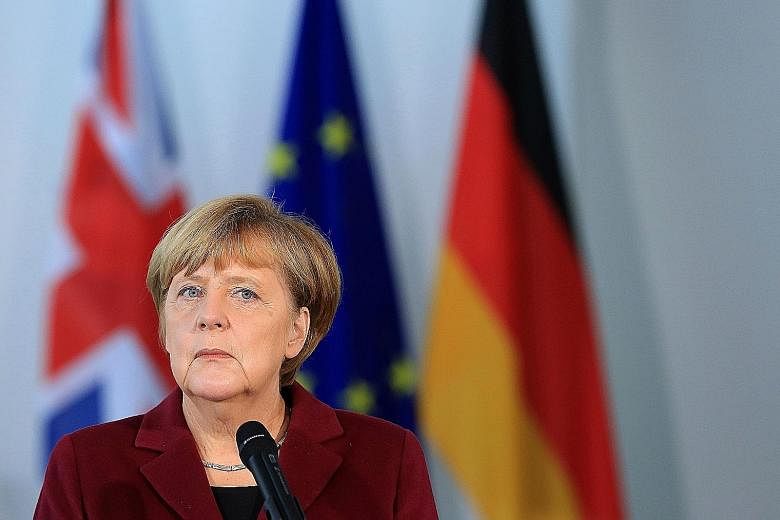BERLIN • Dr Angela Merkel told her party yesterday that she will seek a fourth term as German Chancellor in next year's election, ending months of speculation.
The Chancellor revealed her plans at a meeting of her Christian Democratic Union's executive board in Berlin yesterday, three members of her party said, asking not to be named because the decision had not yet been made public.
She called a news conference for 1800 GMT (2am Singapore time today), a sign interpreted by politicians and the media that she has made up her mind.
Dr Merkel's candidacy for the party leadership she has held since 2000 will now go to a vote at the CDU's annual convention in the western city of Essen on Dec 5-6.
Assuming she is re-elected, she would then contest federal elections in autumn next year as her party's candidate to be chancellor.
The 62-year-old conservative is widely seen as a stabilising force in Europe at a time of uncertainty after Britain's vote to leave the European Union and the election of Mr Donald Trump as the next United States President.
Dr Merkel had long refused to be drawn on her plans for the general election, expected in September or October next year, saying only that she would make the announcement "at the appropriate time".
A pragmatist, she has steered Europe's biggest economy through the financial crisis and the euro zone debt crisis and has won respect internationally - US President Barack Obama on Thursday described her as an "outstanding" ally.
However, her decision last year to open Germany's borders to around 900,000 migrants, mostly from war zones in the Middle East, angered many voters and hit her personal ratings.
Her party has slumped in regional elections in the past year while support for the anti-immigrant Alternative for Germany (AfD) has swelled.
In September, after a heavy defeat for the CDU in a Berlin state election, a humbled Dr Merkel surprised the country by saying she wished she could turn the clock back on the migrant crisis, though she stopped short of saying her policy was a mistake.
Dr Merkel, who grew up in Communist East Germany, is something of a loner. A physicist who became involved in politics only after the fall of the Berlin Wall in 1989, she is seen as a talented negotiator but has also shown a ruthless streak.
A Protestant woman in a mainly Catholic and male-dominated party, at least when she became its leader in 2000, Dr Merkel never built up a regional power base but, over the years, she has rid herself of her main male rivals and has no obvious successor.
She still requires the backing of her Christian Social Union (CSU) allies in Bavaria, who have fiercely criticised her open-door migrant policy but, with no obvious candidate of their own, are widely expected to fall in behind her.
Polls put her conservative bloc around 10 points ahead of its nearest rival, the Social Democrats, with whom she shares power.
Many pollsters see another "grand coalition" as the most likely option after the September election, although the rise of the AfD makes coalition arithmetic more complicated. By standing again, she could end up matching the 16 years in office of her former mentor, Mr Helmut Kohl, who presided over the 1989 fall of the Berlin Wall.
It was Dr Merkel who broke with Mr Kohl and told her party in 1999, in the midst of a funding scandal, that it should move on without him.
Observers said the recent seismic shifts in global politics could drive traditionally risk-averse German voters back to her fold.
Fifty-five per cent of the electorate want her to stay in office, up from 42 per cent in August, a poll for Bild am Sonntag newspaper showed yesterday.
REUTERS, AGENCE FRANCE-PRESSE, BLOOMBERG

